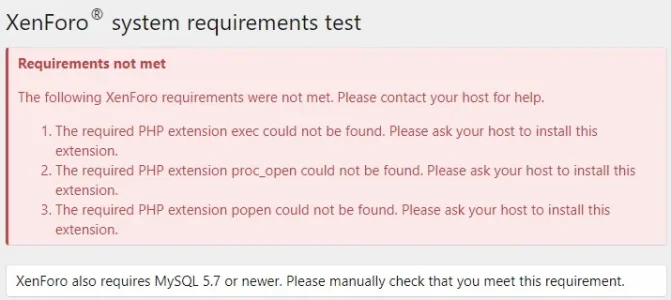bzcomputers
Well-known member
As it currently sits the XenForo requirements script (https://xenforo.com/purchase/requirements-zip) does not function check all required and recommended functions. It still currently relies on what php.ini reports through
It currently appears these required and recommended functions are not actually function checked:
Currently if any of those functions are disabled outside of php.ini, the current XenForo requirements script will not report them as being disabled. This could cause XenForo admins to be unaware their server setups are incompatible with all of XenForo's features and issues could be occurring, some of which could be hard to detect and diagnose.
ini_get('disable_functions'); to determine if many functions are available. This is not very accurate as php functions can be disabled in numerous places on the server outside of php.ini, for example through server configuration files like .htaccess, web server settings (e.g., in Apache's httpd.conf or Nginx's nginx.conf), and possibly through additional server security software/hardware. The only way to accurately determine if a required or recommended function is disabled on the server would be to check each individual function with function_exists.It currently appears these required and recommended functions are not actually function checked:
ini_set, fsockopen, exec, escapeshellarg, proc_open, popen, and set_time_out.Currently if any of those functions are disabled outside of php.ini, the current XenForo requirements script will not report them as being disabled. This could cause XenForo admins to be unaware their server setups are incompatible with all of XenForo's features and issues could be occurring, some of which could be hard to detect and diagnose.

